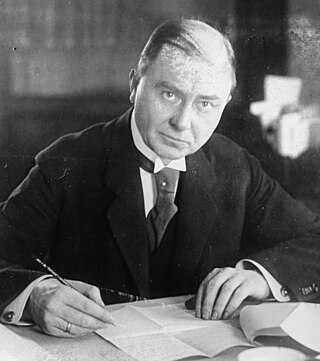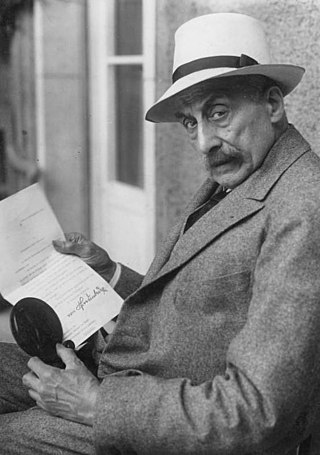
Hans Marchwitza was a German writer, proletarian poet, and communist.

Wilhelm Murr was a Nazi German politician. From 1928 until his death he was Gauleiter of Gau Württemberg-Hohenzollern, and from early 1933 held the offices of State President and Reichsstatthalter of Württemberg. During World War II he also rose to the rank of SS-Obergruppenführer in addition to his Party posts. At war's end he committed suicide with poison while in French custody.

Werner Naumann was a German civil servant and politician. He was State Secretary in Joseph Goebbels' Ministry of Public Enlightenment and Propaganda during the Nazi Germany era. He was appointed head of the Propaganda Ministry by Adolf Hitler in his last will and testament after Goebbels was promoted to Reichskanzler. Naumann was present in the Führerbunker in late April 1945. He eluded capture and led an underground existence under an assumed name until an amnesty in 1950. For the next few years, he headed a clandestine Neo-Nazi organization known as the Naumann Circle until it was exposed and he was arrested. He was subsequently judged to be a "Category II offender" in a denazification proceeding.
The Freundeskreis der Wirtschaft, or Circle of Friends of the Economy was a group of German industrialists whose aim was to strengthen the ties between the Nazi Party and business and industry. The group was formed and co-ordinated by Wilhelm Keppler, one of Adolf Hitler's close economic advisors.

Karl Jarres was a German lawyer and politician of the German People's Party during the Weimar Republic. From 1923 to 1924, he was the minister of the Interior and vice-chancellor of Germany. Jarres was also the long-serving mayor of Duisburg from 1914 to 1933. After the Nazis deposed him, he started a career in industry.

Richard Wendler was a high-ranking Nazi official during World War II. During the occupation of Poland, he was the Governor of new District Lublin in the General Government, in charge of Lublin concentration camp and the creation of the Częstochowa Ghetto, among others. Before his deployment to Poland, he was the mayor of the city Hof between 1933 and 1941 and became an SS-Gruppenführer in 1942 during the murderous Operation Reinhard. Wendler's sister was married to a brother of Reichsführer-SS Heinrich Himmler

The Reich Chamber of Culture was a government agency in Nazi Germany. It was established by law on 22 September 1933 in the course of the Gleichschaltung process at the instigation of Reich Minister Joseph Goebbels as a professional organization of all German creative artists. Defying the competing ambitions of the German Labour Front (DAF) under Goebbels' rival Robert Ley, it was meant to gain control over the entire cultural life in Germany creating and promoting Aryan art consistent with Nazi ideals.
Carl Wurster was a German chemist and Wehrwirtschaftsführer during the Third Reich. He subsequently became one of the leading figures in post-war Germany's industrial life.

The Adlerschild des Deutschen Reiches was an honorary award granted by the German president for scholarly or artistic achievements. It was introduced during the Weimar Republic, under President Friedrich Ebert and continued under Nazi Germany. It was a metal disc with a German imperial eagle on a pedestal. It was a high and infrequently awarded honor, received by around 70 people in total.

A Wehrwirtschaftsführer was, during the time of Nazi Germany (1933–1945), an executive of a company or of a large factory. Wehrwirtschaftsführer were appointed, starting in 1935, by the Wehrwirtschafts und Rüstungsamt being a part of the Oberkommando der Wehrmacht (OKW), that was pushing the build-up of arms for the Wehrmacht. Appointments aimed to bind the Wehrwirtschaftsführer to the Wehrmacht and to give them a quasi-military status.
Anna Leibbrand was a left-wing German political activist and writer.

The State Academy of Fine Arts Stuttgart is a public fine art university in Stuttgart, Germany. It was founded in 1761 and has been located on the Weissenhof since 1946. Its campus consists of three buildings: the Altbau, Neubau 1 or "Architects' Building", and Neubau 2.
Helmut Krausnick was a German historian and writer. From 1959 to 1972, he was the head of the Institute of Contemporary History, a leading German research institute on the history of National Socialism.
Ludwig Hoelscher was a German cellist. He played internationally as a soloist, and was well known as a chamber musician, first playing from 1932 in Elly Ney's piano trio, then in the Strub Quartet and other formations. He was an important cellist of the Nazi era, playing in propaganda concerts and teaching in Berlin and Salzburg. After the World War, he taught at the Musikhochschule Stuttgart and played internationally. He played the world premieres of more than 50 compositions.
Hans Müller-Kray was a German conductor, music director and academic teacher.

The Naumann Circle, also sometimes referred to as the Gauleiter Circle or the Naumann Affair, was an organization of former German adherents of the Nazi Party that was formed in the German Federal Republic several years after the end of the Second World War. It was founded and led by Werner Naumann, the last State Secretary of the Reich Ministry of Public Enlightenment and Propaganda. Between 1951 and early 1953, the organization attempted to infiltrate the Free Democratic Party (FDP) and two smaller parties to lay the groundwork for a possible return to power. British security forces disrupted the cabal by arresting Naumann and several of his associates in early 1953. Handed over to West German authorities, the accused were investigated but the charges ultimately were dismissed by the criminal court due to insufficient evidence.











